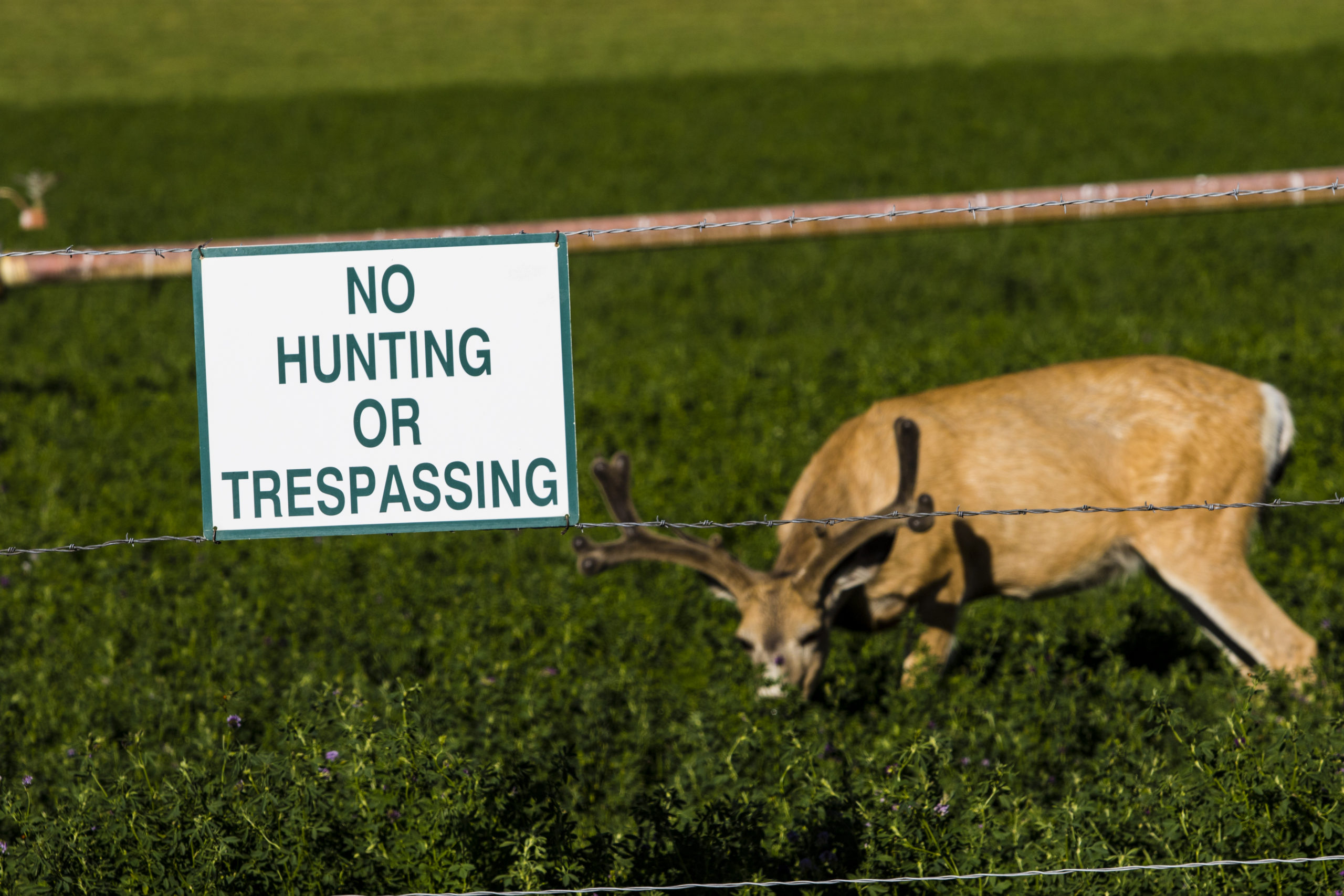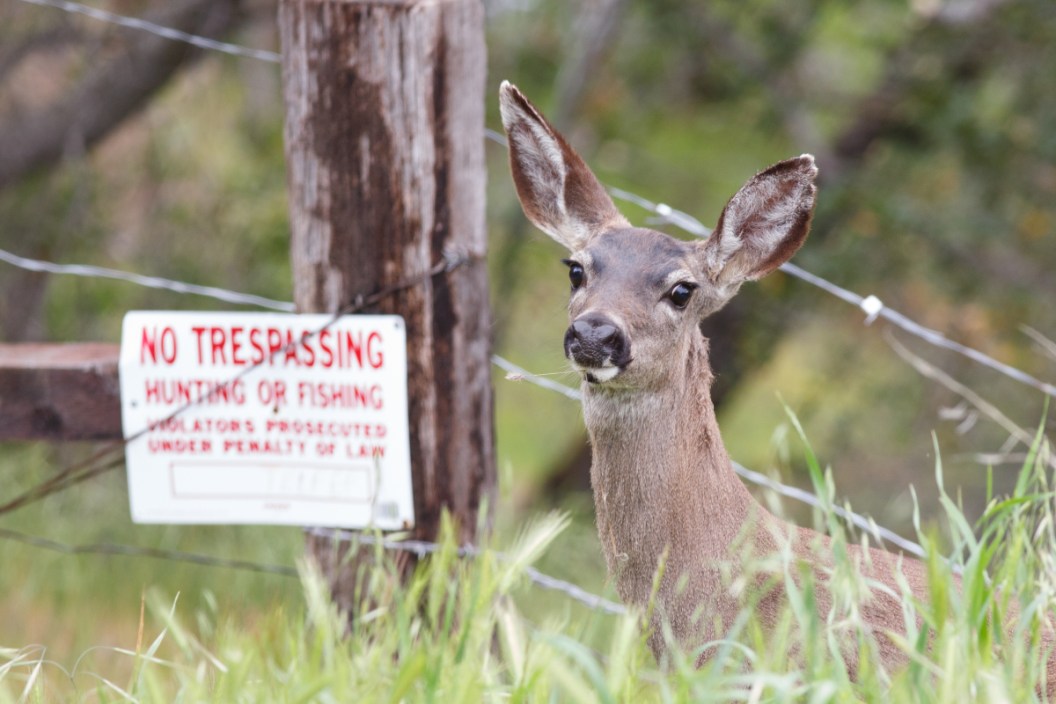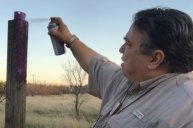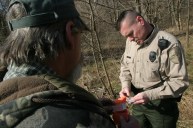These are key things for property owners to consider.
For anyone who has worked hard to acquire their own piece of hunting heaven, nothing is more frustrating than discovering you have trespassers on your land. Sadly, poachers invading private property happens all the time across the country. Especially in known big buck states like Iowa or Kansas where public lands may be overcrowded.
Trespassing laws can be quite convoluted and complicated. Each state law may say something a little different. Which is why we're not going to go state by state to tell you what you need to do to properly post your land.
Instead, we're going to go over some of the more common threads when it comes to property rights and keeping others off your land. These are key points to keep in mind when you head out to start posting your land if you want to keep others off it and prosecute someone who enters without you, the owner's permission.
Laws are different from state to state.

Getty Images: Oppiz
Most people are probably already aware of this, but it bears repeating. Because there have been cases of landowners and homeowners finding out too late there's no criminal charges law enforcement officers can bring because either their land wasn't properly posted, or the actions of the violating person didn't fall under the proper definitions for trespassing.
For instance, the state of New Hampshire is a fascinating case. Private land is completely open to outdoor recreational activities by the public all year-round. That means anyone has the legal right to walk onto your land at any time and hunt. Unless of course you post your property. New Hampshire state law says one must post "No Trespassing" or "No Hunting" signs "in letters at least two inches high, and with the owner's name and address. The signs may be no further than 100 yards apart on all sides of the property and shall also be posted at gates, bars, and all commonly used entrances."
In short, so long as you do that, your land is protected, and you can pursue trespass charges against a person. Keep in mind that New Hampshire Fish and Game says you WILL have to go to court to testify against the person who unlawfully entered your land. It's worth noting that New Hampshire is a rare case here in the United States.
It pays to know the many exemptions that can prevent you from pursuing a trespass conviction. For instance, states like Michigan and Louisiana allow a person to enter private property without permission to retrieve a hunting dog. North Dakota allows hunters to cross onto posted land without consent of the landowner to retrieve wounded game, so long as they first shot the animal in an area they were allowed to hunt. They also are not allowed to bring a gun or bow, but they can drive a vehicle onto the land to pick up the carcass. However, in Texas, this same practice is strictly prohibited and the hunter must gain permission to enter before pursuing injured game.
There are lots of little quirks in trespassing laws from state to state once you start to really dig into it. And in most areas, it's on you as a property owner to know them. Most trespassing cases without damage to a person's property require the landowner to prove the violator as knowingly there without permission or after being asked to leave, and that can be difficult to prove in court without proof.
Know what constitutes "posted" for your state.
Almost every state clearly defines exactly what you need to do to post your land against trespassers. In most instances a simple sign will suffice, although many states specify how large the lettering needs to be, or how far apart the signs need to be posted. For instance, according to Las Vegas Defense group, no trespassing signs must be: "close enough so that a person at one sign can see another. And never more than 500 feet apart."
In some states like Texas, just he presence of a fence is enough to indicate that entry to the land is forbidden. Many states like Oklahoma automatically consider a property off-limits if there are agricultural crops present. In most instances, no trespassing signs are not even a requirement if corn or beans are present.
One method of posting your land that is known to most hunters are "purple paint" laws. It's basically a more efficient and time-saving method of posting your land to outsiders. Although in some states they use fluorescent orange instead of purple.
In Texas, landowners can post their property using "vertical lines of not less than eight inches in length and not less than one inch in width; placed so that the bottom of the mark is not less than three feet from the ground or more than five feet from the ground; and placed at locations that are readily visible to any person approaching the property and no more than 100 feet apart on forest land or 1,000 feet apart on land other than forest land."
Purple paint law is most often associated with Texas, but states like Missouri and Indiana have adopted similar rules. I live in Michigan but frequently travel to Indiana and have noticed a marked uptick in people using this method to post their property down there. Make sure to research to see if your state has a law like this before you start putting paint everywhere. Because this method does you no good if it's not the law in your state.
Maintain your posted signs.

Getty Images: Roitan
Remember that for law enforcement to prove that an infraction has occurred, in most cases they need clear proof the violating person has knowingly violated the law. It becomes much harder to plead your case if all your no trespassing or no hunting signs have all long since fallen off the tree or fence they were attached to. In a state like New Hampshire a good criminal defense attorney can probably make a compelling case against criminal trespass if it appears it isn't posted anymore.
The point is, make it a habit to regularly check on the borders of your land and fix any signs that have gotten faded or have fallen. It's nature, this stuff happens whether you like it or not. Fresh, maintained signs are also going to make for a better deterrent for poachers than a property here all the signs have fallen. It sends a clear message that someone is watching and taking care of the property.
Even if you use purple paint, it pays to go around from time to time and freshen it up. Paint can and will fade eventually making it harder to enforce criminal trespass laws.
Products featured on Wide Open Spaces are independently selected by our editors. However, when you buy something through our links, we may earn a commission.
For more outdoor content from Travis Smola, be sure to follow him on Twitter and check out his Geocaching and Outdoors with Travis YouTube channels.
NEXT: BOOBY TRAP BLASTS PAINT ALL OVER TRESPASSING HUNTER
WATCH





